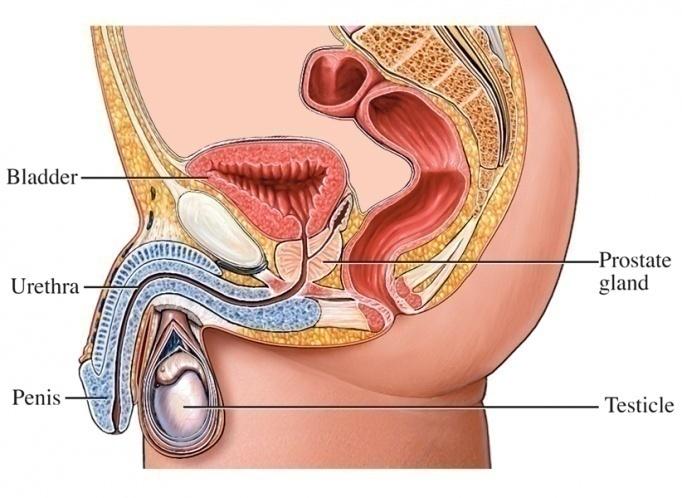The prostate is a small gland located just below the bladder in men. As men age, it is common for the prostate to enlarge, causing bothersome symptoms such as frequent urination, difficulty starting and stopping urination, weak urine flow, and even urinary tract infections. If you're looking for ways to treat an enlarged prostate, read on to explore various options that can help alleviate these symptoms.

1. Natural Remedies for Enlarged Prostate:
- Saw Palmetto: This herb has been used for centuries to treat urinary symptoms related to an enlarged prostate. It's available in supplement form and may help alleviate symptoms such as frequent urination.
- Pygeum: Derived from the bark of an African tree, pygeum has shown promising results in reducing urinary symptoms associated with an enlarged prostate. It can be found in supplement form as well.
- Stinging Nettle: This herb has been used in traditional medicine to treat an enlarged prostate. It may help improve urinary flow and reduce urinary symptoms.
2. Lifestyle Changes:
- Diet: Certain dietary modifications may help manage the symptoms of an enlarged prostate. Limiting caffeine and alcohol intake, avoiding spicy foods, and increasing the consumption of fruits and vegetables can be beneficial.
- Exercise: Regular physical activity has been shown to improve urinary symptoms. Engaging in activities such as walking, swimming, or cycling can help alleviate the symptoms of an enlarged prostate.
3. Medical Interventions:
- Medications: Prescription medications, such as alpha-blockers and 5-alpha-reductase inhibitors, can help relax the muscles of the prostate and reduce its size. These medications are typically prescribed by a healthcare professional.
- Minimally Invasive Procedures: For more severe cases, minimally invasive procedures such as prostate artery embolization (PAE) or transurethral microwave thermotherapy (TUMT) may be recommended. These procedures aim to alleviate symptoms and reduce prostate size.
- Surgery: In extreme cases, surgical intervention, such as a transurethral resection of the prostate (TURP), may be necessary. This procedure involves removing excess prostate tissue to improve urinary flow.
It is crucial to consult with a healthcare professional before starting any treatment for an enlarged prostate. They will be able to offer tailored advice based on your specific condition and medical history.
In conclusion, managing an enlarged prostate entails a combination of natural remedies, lifestyle changes, and medical interventions. By adopting these strategies, you can significantly improve your urinary symptoms and overall quality of life.
Remember to prioritize your health and seek professional guidance when treating an enlarged prostate. By doing so, you can find the most suitable treatment plan that works for you.
Related FAQs about how to treat enlarged prostate
What are the common symptoms of an enlarged prostate?
The common symptoms of an enlarged prostate include frequent urination, difficulty starting and stopping urination, weak urine flow, and urinary tract infections.
Are there any natural remedies for treating an enlarged prostate?
Yes, there are natural remedies that may help alleviate the symptoms of an enlarged prostate. Saw Palmetto, Pygeum, and Stinging Nettle are herbs that have shown promising results in reducing urinary symptoms.
What lifestyle changes can I make to manage an enlarged prostate?
Modifying your diet by limiting caffeine and alcohol intake, avoiding spicy foods, and increasing the consumption of fruits and vegetables can be beneficial. Regular physical activity, such as walking or swimming, is also helpful in managing symptoms.
What medical interventions are available for an enlarged prostate?
Prescription medications, including alpha-blockers and 5-alpha-reductase inhibitors, can help relax the prostate muscles and reduce its size. Minimally invasive procedures like prostate artery embolization (PAE) or transurethral microwave thermotherapy (TUMT) may be recommended, and in severe cases, surgery such as transurethral resection of the prostate (TURP) may be necessary.
Why is it important to consult with a healthcare professional?
Consulting with a healthcare professional is important because they can provide personalized advice based on your individual condition and medical history. They can guide you in choosing the most suitable treatment plan and monitor your progress to ensure the best possible outcome.
Glossary about how to treat enlarged prostate
1. Prostate: The prostate is a small gland located just below the bladder in men. It is part of the male reproductive system and plays a role in producing semen.
2. Enlarged Prostate: Enlarged prostate, also known as benign prostatic hyperplasia (BPH), is a condition where the prostate gland becomes enlarged, causing urinary symptoms and affecting urinary flow.
3. Saw Palmetto: Saw palmetto is a type of palm tree native to the southeastern region of the United States. Its berries are used in herbal supplements and have been traditionally used to alleviate urinary symptoms related to an enlarged prostate.
4. Pygeum: Pygeum is derived from the bark of the African plum tree. It has been used in traditional medicine to treat urinary symptoms associated with an enlarged prostate.
5. Stinging Nettle: Stinging nettle is a plant that has been used in traditional medicine for various purposes, including the treatment of urinary symptoms related to an enlarged prostate.
6. Alpha-blockers: Alpha-blockers are a class of medications that work by relaxing the muscles of the prostate and bladder neck, improving urinary flow and reducing symptoms associated with an enlarged prostate.
7. 5-alpha-reductase inhibitors: 5-alpha-reductase inhibitors are medications that inhibit the action of an enzyme called 5-alpha-reductase, which converts testosterone to dihydrotestosterone (DHT). These medications help reduce the size of the prostate gland.
8. Prostate Artery Embolization (PAE): Prostate artery embolization (PAE) is a minimally invasive procedure that involves blocking the blood supply to the prostate, which can help reduce its size and alleviate urinary symptoms.
9. Transurethral Microwave Thermotherapy (TUMT): Transurethral microwave thermotherapy (TUMT) is a minimally invasive procedure often used to treat an enlarged prostate. It involves delivering microwave energy to the prostate to reduce its size and improve urinary symptoms.
10. Transurethral Resection of the Prostate (TURP): Transurethral resection of the prostate (TURP) is a surgical procedure commonly used to treat severe cases of an enlarged prostate. It involves removing excess prostate tissue to improve urinary flow.
